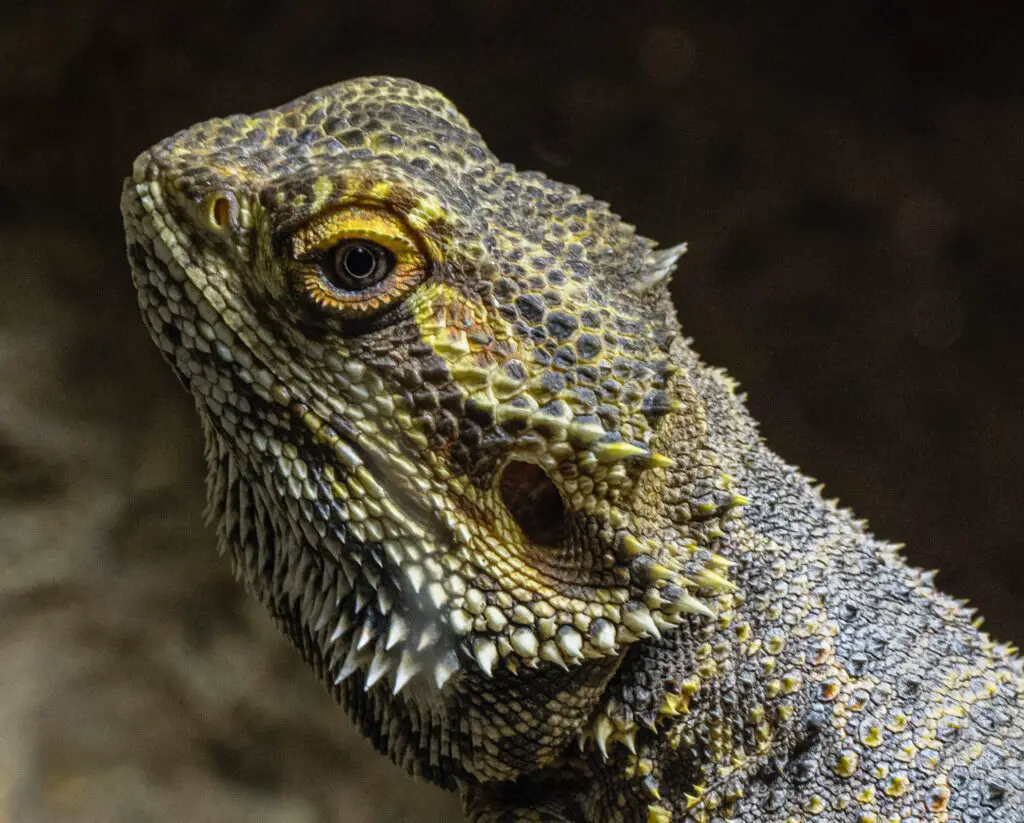Why won’t my bearded dragon eat
Why won’t my bearded dragon eat: Bearded dragons, with their captivating appearance and docile nature, have become increasingly popular as reptile pets. These unique creatures, scientifically known as Pogona vitticeps, are native to the arid regions of Australia.
Their popularity stems from their striking appearance, which includes a spiky body adorned with a beard-like structure under their chin. Bearded dragons are renowned for their docility and ease of care, making them an ideal choice for reptile enthusiasts of all levels.
Understanding the eating habits and behavior of these fascinating creatures is crucial for ensuring their overall well-being and happiness in captivity. As omnivorous reptiles, bearded dragons possess an adaptable appetite that encompasses a diverse range of food items.
In the wild, they primarily feed on insects such as crickets and mealworms but also indulge in vegetation such as leafy greens and fruits when available. However, replicating the natural diet within captive settings can sometimes pose challenges.
Brief Overview of Bearded Dragons as Popular Reptile Pets
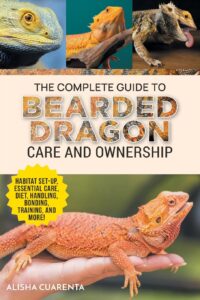 Bearded dragons have earned a place in the hearts of pet owners due to their gentle demeanor and relatively low maintenance requirements compared to other reptilian companions. These gentle creatures boast a lifespan ranging from 10 to 15 years when provided with proper care, ensuring that they become long-term companions for many enthusiasts.
Bearded dragons have earned a place in the hearts of pet owners due to their gentle demeanor and relatively low maintenance requirements compared to other reptilian companions. These gentle creatures boast a lifespan ranging from 10 to 15 years when provided with proper care, ensuring that they become long-term companions for many enthusiasts.
Their manageable size also contributes to their popularity among pet owners. Adult bearded dragons generally reach lengths between 18 to 24 inches from head to tail tip—a size that makes them suitable for various living spaces without requiring excessive room or enclosures.
Additionally, bearded dragons display intriguing behaviors that captivate both seasoned herpetologists and novices alike. From head bobbing during territorial displays to arm waving as a means of communication or submission, these reptiles exhibit a wide range of behaviors that make them highly interactive pets.
Importance of Understanding their Eating Habits and Behavior
Subtitle: Nourishing the Dragon Within Proper nutrition is a cornerstone of maintaining the health and vitality of any living creature, including bearded dragons.
Understanding their eating habits and behavior is vital for ensuring that their dietary requirements are met effectively. By embracing this knowledge, pet owners can help ensure a long and fulfilling life for their scaly companions.
A comprehensive understanding of bearded dragons’ natural diet allows pet owners to provide appropriate nutrition that mimics their wild counterparts. These reptiles possess unique nutritional needs that must be met to prevent deficiencies or imbalances in vitamins, minerals, and macronutrients necessary for growth, immune function, and overall well-being.
Equally important is recognizing the impact that diet has on a bearded dragon’s behavior. A well-fed dragon will exhibit greater energy levels, increased activity, brighter coloration, and enhanced cognitive functions.
Conversely, poor nutrition can lead to lethargy or even aggressive tendencies due to discomfort or deficiencies. By delving into the intricacies of their eating habits and behavior patterns, we can unlock the secrets to keeping these enchanting creatures healthy and content in our care.
Understanding Bearded Dragons’ Natural Diet
Exploring the Native Habitat and Diet of Bearded Dragons in Australia
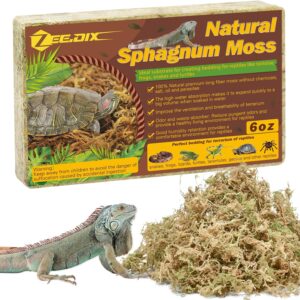 In order to comprehend why your bearded dragon may be refusing to eat, it is imperative to delve into their natural habitat and diet. Bearded dragons are endemic to the arid regions of Australia, where they have adapted to survive in a challenging environment.
In order to comprehend why your bearded dragon may be refusing to eat, it is imperative to delve into their natural habitat and diet. Bearded dragons are endemic to the arid regions of Australia, where they have adapted to survive in a challenging environment.
These reptiles, scientifically known as Pogona vitticeps, primarily inhabit grasslands, deserts, and wooded areas with temperate climates. Within their native terrain, bearded dragons have access to a diverse range of food sources that shape their natural diet.
In the wild, these omnivorous creatures exhibit a penchant for insects such as crickets, roaches, mealworms, and silkworm larvae. These protein-rich prey items form an essential part of their nutritional intake.
Additionally, they also consume various plant matter including leafy greens like collard greens or mustard greens and vegetables like carrots or squash. Fruits such as berries or melons are occasional treats that provide them with natural sugars.
Discussion on the Omnivorous Nature of Bearded Dragons
Bearded dragons possess an intriguing dietary preference due to their omnivorous nature. This means they can consume both animal-based protein sources and vegetation for sustenance. Developing an understanding about this crucial aspect allows us to provide them with a well-rounded diet in captivity.
While insects constitute a vital component of their diet due to high protein content necessary for growth and energy production, leafy green vegetables serve as an important source of vitamins and minerals. The fibrous plant matter assists in digestion while providing hydration through its water content.
Furthermore, incorporating a variety of fruits helps supplement their diet with additional nutrients while adding palatability to meals offered in captivity. Nevertheless, it is important not to overdo the fruit intake, as high sugar levels may lead to gastrointestinal issues or obesity.
Why Wont My Bearded Dragon Eat: Highlighting the Importance of Providing a Balanced Diet
Ensuring a balanced diet is of utmost importance when it comes to the well-being and health of your bearded dragon. A lack of essential nutrients can lead to a multitude of problems, including appetite suppression. Hence, it is necessary to replicate their natural dietary requirements as closely as possible in captivity.
A balanced diet for bearded dragons should consist of approximately 70% leafy greens and vegetables, 20% insects, and 10% fruits. By offering a variety of nutritious options within each category, you provide them with a wide range of essential vitamins, minerals, and macronutrients they require for optimal growth and overall health.
It is crucial to note that different life stages require different dietary proportions. For instance, juvenile bearded dragons typically have higher protein requirements due to their rapid growth rate compared to adult specimens.
Appropriate supplementation with calcium and multivitamins is also necessary to prevent deficiencies that may negatively impact their appetite or overall health. By crafting a well-rounded diet that closely resembles their natural feeding habits in the wild while maintaining proportionate nutritional values at various life stages, we can ensure our scaly companions thrive on an appropriate meal plan that satiates their hunger while supporting optimal health and vitality.
Common Reasons Why Bearded Dragons May Refuse to Eat
Environmental Factors:
One crucial factor that can cause a bearded dragon to refuse food is an inadequate temperature gradient within their enclosure. Bearded dragons are ectothermic creatures, which means their body temperature relies on the surrounding environment.
If the temperature is too low, it can impair their digestion and overall appetite. Therefore, it is vital to provide a basking spot with a proper heat source where they can regulate their body temperature effectively.
Another environmental factor that may contribute to a bearded dragon’s lack of appetite is insufficient UVB lighting. UVB rays are essential for these reptiles as they aid in synthesizing vitamin D3, which plays a crucial role in calcium absorption.
Without adequate UVB exposure, bearded dragons may develop vitamin D deficiency, leading to reduced appetite and overall health issues. Therefore, providing them with access to high-quality UVB lighting for the recommended duration each day is imperative for their well-being.
Stress-related Issues:
Bearded dragons are sensitive creatures, prone to stress from various factors in their environment. Recent changes in their surroundings or handling can cause temporary loss of appetite as they adapt and adjust to new conditions.
It’s important to introduce any changes gradually and provide them with ample time to acclimate. Additionally, the presence of other pets or disturbances near their enclosure can induce stress in bearded dragons, leading to decreased appetite.
These reptiles prefer a calm and quiet environment where they feel safe and secure. Minimizing disturbances around the enclosure by placing it in a quiet area of your home or relocating other pets’ activities away from it will help alleviate stress and encourage healthy eating habits.
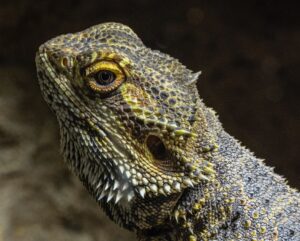
Health Concerns:
There are certain health issues that can impact a bearded dragon’s eating behavior significantly. Parasitic infections, such as intestinal worms or coccidia, can cause digestive problems and result in a loss of appetite.
Regular fecal examinations by a reptile veterinarian can help identify and treat these issues promptly. Dental problems, such as tooth decay or mouth injuries, can also hinder a bearded dragon’s ability to eat comfortably.
If they experience pain or discomfort while chewing, they may avoid food altogether. Regular observation of their oral health and seeking veterinary assistance if any abnormalities are noticed is vital to ensure proper eating habits.
Metabolic bone disease (MBD) is another condition that can affect bearded dragons. MBD occurs due to calcium and vitamin D3 deficiencies, leading to weakened bones and muscle function.
This disease not only causes weakness but also impacts their appetite negatively. Providing a well-balanced diet rich in calcium and vitamin D3 supplements under the guidance of a reptile veterinarian will help prevent or manage MBD.
Why Wont My Bearded Dragon Eat: Troubleshooting Tips for Encouraging Eating Behavior
Creating an Optimal Habitat:
To ensure that your bearded dragon maintains a healthy appetite, it is crucial to create an optimal habitat within their enclosure. This involves ensuring proper temperature gradients throughout the tank, with a warm basking spot where they can regulate their body temperature adequately. A thermometer should be used to monitor temperatures regularly.
In addition to temperature, providing appropriate UVB lighting is essential for vitamin D synthesis and overall well-being. High-quality UVB bulbs designed specifically for reptiles should be used, placed at the recommended distance from the basking spot according to the manufacturer’s instructions.
Reducing Stress Factors:
Minimizing stressors in your bearded dragon’s environment is vital for promoting healthy eating habits. Avoid disturbances near their enclosure by placing it in a quiet area away from high foot traffic or loud noises.
Additionally, maintaining a consistent routine for feeding and handling helps them feel secure and reduces anxiety. This includes feeding them at the same time each day and handling them gently and with care.
Monitoring Health Indicators:
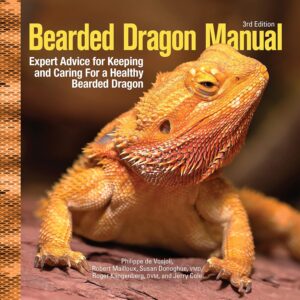 Regular veterinary check-ups are essential for monitoring your bearded dragon’s health and ensuring any potential issues are addressed promptly. During these visits, the veterinarian can conduct thorough examinations, including checking for parasites, dental problems, or signs of metabolic bone disease. By monitoring their overall health indicators such as weight, hydration levels, and behavior, you can identify any concerns early on before they impact their appetite.
Regular veterinary check-ups are essential for monitoring your bearded dragon’s health and ensuring any potential issues are addressed promptly. During these visits, the veterinarian can conduct thorough examinations, including checking for parasites, dental problems, or signs of metabolic bone disease. By monitoring their overall health indicators such as weight, hydration levels, and behavior, you can identify any concerns early on before they impact their appetite.
While it can be concerning when a bearded dragon refuses to eat, understanding the common reasons behind this behavior can help address the issue effectively. Environmental factors like inadequate temperature gradients and insufficient UVB lighting play a significant role in their appetite. Stress-related issues due to recent changes or disturbances nearby can also contribute to loss of appetite.
Furthermore, health concerns such as parasitic infections, dental problems, or metabolic bone disease need to be considered. By creating an optimal habitat with proper temperature gradients and providing appropriate UVB lighting, you can encourage healthy eating habits in your bearded dragon.
Reducing stress factors through a calm environment and consistent routines will also help restore their appetite. Regular veterinary check-ups are crucial for monitoring their health indicators and addressing any underlying issues promptly.
Remember that with proper care and attention to your bearded dragon’s needs, most cases of decreased appetite can be resolved successfully. Stay attentive to their well-being and consult a reptile veterinarian if necessary; soon enough your beloved pet will regain its hearty appetite once again!
Further Reading:
- Carolina Custom Cages Terrarium Review
- 8 Best Basking Rocks for Beardie: What Is the Best Choice?
- 10 Best Thermometers for Beardie: How to Choose the Best One?
- 5 Best Beardie Lighting Setups for Beardie Lovers
- 9 Best Heat Lamps for Beardie: Natural Habitat Provided

